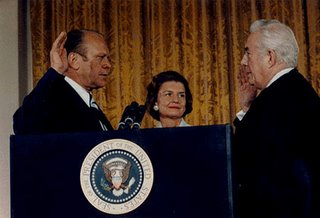


America has lost one of its best men.
Gerald Ford was many things in the course of his life -- Eagle Scout, all-star athlete, war hero, congressional leader, Vice President and eventually President of the United States. It is unfortunate that our modern media culture should remember him mostly for things he was not, rather than for what he was – a good, gracious, and honorable man, and a living repudiation of the cynicism and hatred that have characterized our political culture over the course of the past half century.
President Ford had many detractors. Nixon haters who were lusting for a show trial never forgave him for pardoning his predecessor. The anti-war Left assailed him for keeping Henry Kissinger as Secretary of State and attempting to sustain support for South Vietnam. Pseudo-sophisticates in the national media portrayed this intelligent, gifted and accomplished former sports star as dumb and clumsy. He survived two assassination attempts spawned by counter-cultural lunacy. Most importantly, Reaganite Republicans despised his choice of Nelson Rockefeller to serve as Vice President. In the campaign of 1976 Reaganites launched a determined effort to deny Ford the party’s nomination and, failing that, withheld their support in the general election. The result was that Republican gains in the South were reversed, the region voted solidly for Jimmy Carter, and Ford was defeated by a narrow two-point margin. Despite this conservative betrayal Ford four years later, in a typical generosity of spirit, campaigned vigorously for his old antagonist.
Many have considered Ford to have been ineffectual. It is true that he faced almost insuperable obstacles and suffered failures in Vietnam and on the economic front, but those were not of his own making and can be laid at the feet of the Democratic majority in Congress that persistently denied his requests for action. Ford’s accomplishments were not inconsequential. He did resolve the constitutional crisis to the satisfaction of most of the electorate. He did sign the Helsinki Accords and facilitate a cease fire in the Middle East. He was tough in the Mayaguez crisis and forgiving with regard to draft evaders and deserters. His accomplishments, while modest, do surpass those of the last two years of the Nixon administration and those of his successor in office, Jimmy Carter.
Gerald Ford was not an ideologue. He was a good, generous and decent man and he promoted the careers of men of similar bent. He chose Donald Rumsfeld as his Secretary of Defense, Dick Cheney as Chief of Staff [replacing Rumsfeld who had previously served in that capacity], and appointed George Herbert Walker Bush as ambassador to China and then to head the CIA. Negotiations with the Ford camp in 1980 led to Reagan’s choice of Bush as his Vice President. The rest, as they say, is history.
Since leaving office Gerald Ford has conducted himself impeccably, quietly promoting a number of charitable causes, in stark contrast to the unseemly grandstanding and moral self-aggrandizement of Presidents Carter and Clinton.
In a time of partisan viciousness similar to those in which Gerald Ford ascended to the Presidency, it is good to reflect on the existence of such a man and to take hope that such as he will always be around to rescue us from our follies.



No comments:
Post a Comment